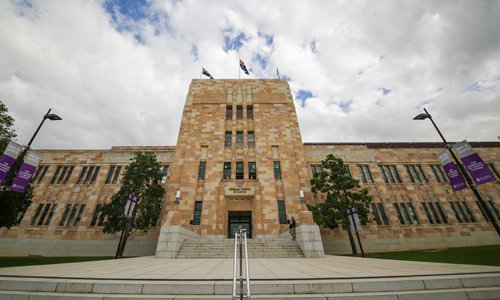HOME >> CHINA
Australia accused of visa delays aimed at Chinese students
By Xu Keyue Source:Globaltimes.cn Published: 2020/1/13 2:37:29

A view of the Australian University of Queensland (UQ) Photo: VCG
More Chinese students have joined the petition against the Australian government over unnecessary visa delays and were critical of the official "cop out" explanation provided in response to their concerns.At least 68 students with offers at Australian universities told the Global Times they had experienced considerable visa delays, after the newspaper reported 165 students and visiting scholars encountered similar dilemmas.
The delays were specifically targeted at Chinese and treated as "national security checks," the students told the Global Times.
Of the 233 students and visiting scholars, 186 have been waiting for their visas for over four months, and over a dozen waiting for more than one year. The students wanted to continue studying advanced Science, Technology, Engineering and Math (STEM) at over 20 universities and research institutions like the University of Melbourne, Monash University, and the University of Queensland.
Qing Wu (pseudonym), who was accepted to study Computer Science in Australia, and who started the formal petition, told the Global Times on Sunday that the response from Australia's Department of Home Affairs was a cop-out answer. Officials addressed the high visa grant rate for Chinese students but did not explain the prolonged delays, and especially with the Chinese PhD candidates in STEM fields.
The latest accusation followed the Home Affairs Department's response to the Global Times on Wednesday that the student visa grant rate for Chinese postgraduate applicants was 98.9 percent from July 1, 2019, to December 31, 2019, higher than the overall rate for the same period.
Officials noted that authorities have to run complete health, character, and national security checks for each applicant, and are not specific to Chinese nationals.
The students also said, "We are assured that the significant visa delay for prospective PhD students are of high authentication and robust evidence."
The students provided the Global Times their analysis report based on " student visas lodged pivot table" and "student visas granted pivot table" from the dataset published by the Australian Department of Home Affairs.
The report compared the amount of postgraduate student visa applications that had been delayed by Australian authorities from 16 countries (outside Australia), including China, India, Indonesia, America from 2012 to 2019.
After analyzing the figures, it was discovered that Chinese applicants had experienced unusually longer delays than those from other countries.
When compared with Pakistan, the delays were twice as long. With other countries like India, the delays were five times greater. And with the US, the delays were 28 times longer.
Data found on the department's website reveals the visa delays experienced by Chinese students are more serious, Qing said.
"We respect the decisions made by the department and do not intend to interfere with them. They have the right to refuse our visas. However, we have the right to tell the truth to the public and future PhD candidates in Australia that the Home Affairs department uses the high approval rate to hide the fact that the visa process has slowed. The evidence made us suspect that they had discriminated against us in dealing with visa issues," Qing said.
The students said they hoped the authorities would issue their visas as soon as possible, and even if they're declined, it would still be better than experiencing prolonged delays.
Western media reported in November that the Australian Security Intelligence Organization, which is responsible for the visa security checks, exaggerated rumors regarding a Chinese plot to spy on Australian campuses. The organization also admitted that self-proclaimed Chinese spy Wang Liqiang was not a highly trained intelligence operative dispatched by China.
Posted in: SOCIETY